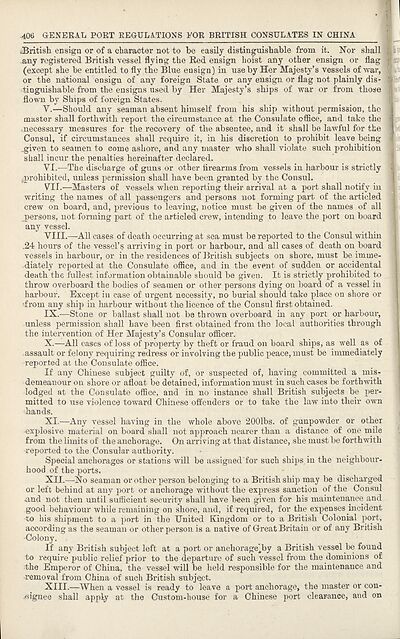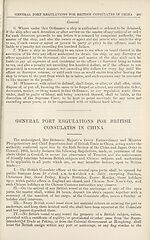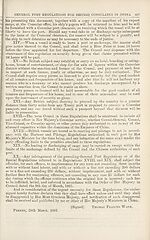1924
(462) Page 406
Download files
Complete book:
Individual page:
Thumbnail gallery: Grid view | List view

-406 GENERAL PORT REGULATIONS FOR BRITISH CONSULATES IN CHINA
.British ensign or of a character not to be easily distinguishable from it. Nor shall
any registered British vessel flying the Bed ensign hoist any other ensign or flag
(except she be entitled to fly the Blue ensign) in use by Her Majesty’s vessels of war,
or the national ensign of any foreign State or any ensign or flag not plainly dis¬
tinguishable from the ensigns used by Her Majesty’s ships of war or from those
flown by Ships of foreign States.
Y.—Should any seaman absent himself from his ship without permission, the
master shall forthwith report the circumstance at the Consulate office, and take the
.necessary measures for the recovery of the absentee, and it shall be lawful for the
Consul, if circumstances shall require it, in his discretion to prohibit leave being
.given to seamen to come ashore, and any master who shall violate such prohibition
shall incur the penalties hereinafter declared.
VI. —The discharge of guns or other firearms from vessels in harbour is strictly
^prohibited, unless permission shall have been granted by the Consul.
VII. —Masters of vessels when reporting their arrival at a port shall notify in
writing the names of all passengers and persons not forming part of the articled
crew on board, and, previous to leaving, notice must be given of the names of all
persons, not forming part of the articled crew, intending to leave the port on board
any vessel.
VIII. —All cases of death occurring at sea must be reported to the Consul within
.24 hours of the vessel’s arriving in port or harbour, and all cases of death on board
vessels in harbour, or in the residences of British subjects on shore, must be imme¬
diately reported at the Consulate office, and in the event of sudden or accidental
death the fullest information obtainable should be given. It is strictly prohibited to
throw overboard the bodies of seamen or other persons dying on board of a vessel in
harbour. Except in case of urgent necessity, no burial should take place on shore or
'from any ship in harbour without the licence of the Consul first obtained.
IX. ^—Stone or ballast shall not be thrown overboard in any port or harbour,
unless permission shall have been first obtained from the local authorities through
the intervention of Her Majesty’s Consular officer.
X. —All cases of loss of property by theft or fraud on board ships, as well as of
assault or felony requiring redress or involving the public peace, must be immediately
reported at the Consulate office.
If any Chinese subject guilty of, or suspected of, having committed a mis¬
demeanour on shore or afloat be detained, information must in such cases be forthwith
lodged at the Consulate office, and in no instance shall British subjects be per¬
mitted to use violence toward Chinese offenders or to take the law into their own
hands.
XI. —Any vessel having in the whole above 2001bs. of gunpowder or other
■explosive material on board shall not approach nearer than a distance of one mile
from the limits of the anchorage. On arriving at that distance, she must be forthwith
'reported to the Consular authority.
Special anchorages or stations will be assigned'for such ships, in the neighbour¬
hood of the ports.
XII. —No seaman or other person belonging to a British ship may be discharged
or left behind at any port or anchorage without the express sanction of the Consul
.and not then until sufficient security shall have been given for his maintenance and
good behaviour while remaining on shore, and, if required, for the expenses incident
to his shipment to a port in the United Kingdom or to a British Colonial port,
according as the seaman or other pei'son is a native of Great Britain or of any British
-Colony.
If any British subject left at a port or anchoragedby a British vessel be found
to require public relief prior to the departure of such vessel from the dominions of
the Emperor of China, the vessel will be held responsible for the maintenance and
removal from China of such British subject.
XIII. —When a vessel is ready to leave a port anchorage, the master or con¬
signee shall apply at the Custom-house for a Chinese port clearance, and on
.British ensign or of a character not to be easily distinguishable from it. Nor shall
any registered British vessel flying the Bed ensign hoist any other ensign or flag
(except she be entitled to fly the Blue ensign) in use by Her Majesty’s vessels of war,
or the national ensign of any foreign State or any ensign or flag not plainly dis¬
tinguishable from the ensigns used by Her Majesty’s ships of war or from those
flown by Ships of foreign States.
Y.—Should any seaman absent himself from his ship without permission, the
master shall forthwith report the circumstance at the Consulate office, and take the
.necessary measures for the recovery of the absentee, and it shall be lawful for the
Consul, if circumstances shall require it, in his discretion to prohibit leave being
.given to seamen to come ashore, and any master who shall violate such prohibition
shall incur the penalties hereinafter declared.
VI. —The discharge of guns or other firearms from vessels in harbour is strictly
^prohibited, unless permission shall have been granted by the Consul.
VII. —Masters of vessels when reporting their arrival at a port shall notify in
writing the names of all passengers and persons not forming part of the articled
crew on board, and, previous to leaving, notice must be given of the names of all
persons, not forming part of the articled crew, intending to leave the port on board
any vessel.
VIII. —All cases of death occurring at sea must be reported to the Consul within
.24 hours of the vessel’s arriving in port or harbour, and all cases of death on board
vessels in harbour, or in the residences of British subjects on shore, must be imme¬
diately reported at the Consulate office, and in the event of sudden or accidental
death the fullest information obtainable should be given. It is strictly prohibited to
throw overboard the bodies of seamen or other persons dying on board of a vessel in
harbour. Except in case of urgent necessity, no burial should take place on shore or
'from any ship in harbour without the licence of the Consul first obtained.
IX. ^—Stone or ballast shall not be thrown overboard in any port or harbour,
unless permission shall have been first obtained from the local authorities through
the intervention of Her Majesty’s Consular officer.
X. —All cases of loss of property by theft or fraud on board ships, as well as of
assault or felony requiring redress or involving the public peace, must be immediately
reported at the Consulate office.
If any Chinese subject guilty of, or suspected of, having committed a mis¬
demeanour on shore or afloat be detained, information must in such cases be forthwith
lodged at the Consulate office, and in no instance shall British subjects be per¬
mitted to use violence toward Chinese offenders or to take the law into their own
hands.
XI. —Any vessel having in the whole above 2001bs. of gunpowder or other
■explosive material on board shall not approach nearer than a distance of one mile
from the limits of the anchorage. On arriving at that distance, she must be forthwith
'reported to the Consular authority.
Special anchorages or stations will be assigned'for such ships, in the neighbour¬
hood of the ports.
XII. —No seaman or other person belonging to a British ship may be discharged
or left behind at any port or anchorage without the express sanction of the Consul
.and not then until sufficient security shall have been given for his maintenance and
good behaviour while remaining on shore, and, if required, for the expenses incident
to his shipment to a port in the United Kingdom or to a British Colonial port,
according as the seaman or other pei'son is a native of Great Britain or of any British
-Colony.
If any British subject left at a port or anchoragedby a British vessel be found
to require public relief prior to the departure of such vessel from the dominions of
the Emperor of China, the vessel will be held responsible for the maintenance and
removal from China of such British subject.
XIII. —When a vessel is ready to leave a port anchorage, the master or con¬
signee shall apply at the Custom-house for a Chinese port clearance, and on
Set display mode to:
![]() Universal Viewer |
Universal Viewer | ![]() Mirador |
Large image | Transcription
Mirador |
Large image | Transcription
Images and transcriptions on this page, including medium image downloads, may be used under the Creative Commons Attribution 4.0 International Licence unless otherwise stated. ![]()
| Asian directories and chronicles > 1924 > (462) Page 406 |
|---|
| Permanent URL | https://digital.nls.uk/196429915 |
|---|
| Attribution and copyright: |
|
|---|---|
| Description | Volumes from the Asian 'Directory and Chronicle' series covering 1917-1941, but missing 1919 and 1923. Compiled annually from a multiplicity of local sources and research. They provide listings of each country's active corporations, foreign residents and government agencies of all nationalities for that year, together with their addresses. Content includes: various treaties; coverage of conflicts; currencies and taxes; consular fees; weights and measures; public holidays; festivals and traditions. A source of information for both Western states and communities of foreigners living in Asia. Published by Hongkong Daily Press. |
|---|---|
| Shelfmark | H3.86.1303 |
| Additional NLS resources: |

